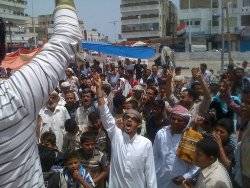As the year of revolution draws to a close, a new "parallel revolution" against corruption is emerging in Yemen. Over the past two weeks strikes have spread across the country and are proving effective, leading to the hope that this Yemeni uprising of 2011 can truly bring change to the Arab world’s poorest country. The chant of "Irhal, Irhal" - "Leave, Leave" - is now being directed at corrupt figures of authority throughout the country.
Unlike some of the other Arab revolutions, especially the Libyan and Syrian ones, the Yemeni revolution was mainly not one of the politically oppressed, but the economically oppressed. The extent of the atmospheric levels of corruption can be seen in the places where protests and strikes have been called. One of the first strikes was by Yemenia Airways workers; the airline, practically bankrupt, has been destroyed by corruption. Flights were stopped at Yemen's main airports and after two days the new Yemeni government removed the director, President Saleh's son-in-law.
After this, the floodgates opened. Military soldiers, traffic officers, government workers and police officers have all protested. They have not allowed corrupt bosses to enter their offices, and many of these figures, not used to such insubordination, fled.
Perhaps the most important demonstration, and the one that indicates that Saleh's powerbase is being seriously eroded, has been at the Yemeni Armed Forces Military Guidance Office, the publishers of the influential army newspaper. The soldiers called for their notoriously corrupt head, General Ali Hassan al-Shater, a key Saleh ally and adviser, to be removed from his position. There have been reports that al-Shater even kept a personal prison to punish officers and soldiers. The protesters managed to gain control of the 26 September newspaper, and published a damning editorial criticizing al-Shater. The Defense Minister has now announced that General al-Shater will be replaced. This is a very important development that has inspired others around the country, implying that no one is untouchable anymore.
The Saleh clique are fearful, with the strikes possibly threatening their military powerbase more than 10 months of protest have. Ahmed Saleh, the President’s son and commander of the elite Republican Guard, has reportedly warned his troops that internal protests would not be tolerated. A Yemeni official told the Associated Press that Ahmed Saleh threatened his soldiers, "We will not permit copying here. Force will be the way to deal with any protest," he told them. In reality, Ahmed Saleh is not in a good position, and it seems increasingly likely that his authority is slipping away.
The protests and strikes have come in a period where revolutionary forces, especially the independent youth, are trying to re-assert their power over the revolution. The 250-km "Life March" from Taiz to Sana'a was an example of this new assertiveness. The "Life March" was an organic protest, under the direction of the youth, and not a ploy by the JMP opposition coalition, as Saleh's GPC party claimed.
The independent youth themselves, a great number of whom are students, have been taking part in the recent demonstrations themselves. Having recently returned to study after almost a year off, many students have used the opportunity to protest against "corrupt" lecturers. The most famous of these protests was at Sana'a University, where students demanded that Dr Muhammad al-Iryani, a Professor of Business, leave. He is well-known for his especially harsh grading of students, resulting in many of them failing his courses. Gathering in the lecture hall, the students chanted at a bewildered looking Iryani, vowing "No Iryani after today".
The overall strike and protest movement has surprised many, with analysts expecting that the next phase in Yemen would be civil war. That may still happen, but it does seemingly look further off. The strikes have unified Yemenis, with corruption cited as the main problem in the country by people who were for and against the revolution alike.
It was also unlikely that people who have protested for so long against dictatorship would suddenly go back to work and accept their own "mini-dictators" in the workplace. These mini-dictators were known for stealing large sums of public money, threatening subordinates, and generally perceiving themselves to be above the law. Those with links to Saleh are not protected by him anymore. With the new spirit of "change" that is seeping through Yemen, it seems that the old way of doing things may be over. Changing the culture of corruption will take a long time, but it is clear that the process has started.
PHOTO CAPTION
Yemenis rally in the southern port city of Aden in April, 2011.
By Abubakr Al-Shamahi
Source: Aljazeera.com


 Home
Home Discover Islam
Discover Islam Quran Recitations
Quran Recitations Lectures
Lectures
 Fatwa
Fatwa Articles
Articles Fiqh
Fiqh E-Books
E-Books Boys & Girls
Boys & Girls  Ramadan
Ramadan Fatwa Audios
Fatwa Audios Month of Mercy
Month of Mercy Women
Women Eed Al- Fitr
Eed Al- Fitr Food Recipes
Food Recipes Videos
Videos

 Prayer Times
Prayer Times












